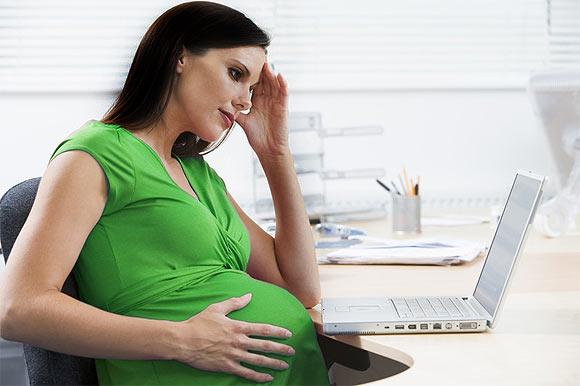Consuming alcohol during pregnancy can majorly impact your baby's overall development.
Children with foetal alcohol syndrome may have problems with their vision, hearing, memory, attention span, warns Dr Anagha Karkhanis.

Although pregnancy is the best phase in a women's life, it brings along with itself a list of dos and don'ts which when followed will not only be beneficial for the expecting mother but also the growing foetus.
Just like expecting mothers must follow a nourishing diet, taking the essential multi-vitamins, get their required dose of sleep and be physically active, they must also consider avoiding a couple of things that are bound to hamper the foetal health in a major way.
Pregnant women must totally distance themselves from smoking or consuming tobacco in any form and above all must give a total miss to drinking alcohol.
Just like consuming too much caffeine is not advisable since it can travel through the placenta and upsurge your baby's rate of heart, alcohol consumption during gestation also can majorly impact your baby's overall development.
A woman drinking during pregnancy has the risk of delivering a baby with FAS (Fetal alcohol syndrome).
Most of us tend to comprehend on what exactly is FAS and will consuming small amounts of alcohol still be an issue.
One must bear in mind that there appears to be absolutely no safe level of alcohol ingestion when you are expecting. Even a minimal intake can prove to be very hazardous to your unborn baby.
What is fetal alcohol syndrome?
Expectant mothers who consume alcohol can give birth to babies having fetal alcohol spectrum disorders, also termed as FASDs.
FASD is the umbrella term for a multitude of ailments. These syndromes can be either minor or at times grave and can cause somatic and psychological birth defects. Types of FASDs comprise of:
- Fetal alcohol syndrome (FAS)
- Partial fetal alcohol syndrome
- Alcohol-related birth defects
- Alcohol-related neurodevelopment disorder
- Neurobehavioral disorder linked with prenatal alcohol exposure
FAS is a severe form of the condition in a child that results from exposure to alcohol during the mother's gestational phase.
Fetal alcohol syndrome can lead to damage of the brain and growth complications. The severity of FAS varies from child to child, and the defects caused by this syndrome are not reversible.
Children who have fallen prey to FAS may have problems with their vision, hearing, memory, attention span, hyper activity syndrome ,and abilities to learn and communicate.
While the defects may differ from person to person, the mutilation is often permanent.
What are the causes of fetal alcohol syndrome?
When a to-be mother drinks alcohol, some of that alcohol effortlessly travels across the placenta and slowly makes its way to the foetus.
The body of a maturing foetus fails to process alcohol in the same way as an adult body does, this is because the lever of the baby is still not fully developed.
The alcohol is more concentrated in the growing foetus, and it can avert plentiful of essential nutrition and oxygen from getting to the foetus's vital organs in the body.
Women must note that the possible damage can be caused in the early few weeks of pregnancy itself when a woman might not even get a confirmation that she is expecting.
The perils intensify if the mother continues to drink and is a heavy drinker. Research has shown that alcohol use appears to be most damaging during the first three months of pregnancy.
Nevertheless, ingesting alcohol at almost any time through pregnancy can be detrimental.
Symptoms
Since FAS covers an extensive range of health issues, there are many possible indicators.
The severity of these signs ranges from mild to severe and can comprise of delivering the baby with a very small head, a smooth edge between the nose and upper lip, eyes that are small and wide-set, a very thin upper lip, or other uncharacteristic and atypical facial structures.
Other symptoms in the baby include, slow growth rate, a height and weight that is well below average, lack of concentration and poor judgement and focus, hyperactivity issues, deferred development and glitches in thinking, movement, social skills and impaired speech, difficulties in seeing or issues with hearing, learning infirmities, academic inadequate, problems with the heart, kidney imperfections and defects, malformed limbs or fingers and mood swings.
How is fetal alcohol syndrome medically identified?
The earlier the diagnosis, the better. Consult with your medical expert if you suspect your child to have fallen trap to FAS.
Let your health expert know if at all you drank while you were expecting.
By conducting a physical examination of the baby may demonstrate a heart murmur or other heart hitches.
As the baby grows, there may be other symptoms that will facilitate further confirming the diagnosis.
FASDs are detected based on the indications like facial topographies, poor and slow growth, and brain involvement, particularly if it is known that the mother drank while she was carrying.
In kids with slighter issues, FASD can be tougher to detect. Further assessment and testing might be required to rule out other conditions.
Pregnant women need to be counselled effectively to explain the harmful impacts it can cause the budding foetus.
There is no definite cure for FAS. But various things can be executed to facilitate a child to reach out to his or her full potential, particularly when the condition is diagonsed early on.
Kids can advantage from constructive therapies like physical, occupational and speech-language therapy.
Even parents and guardians can be counselled accordingly to help them effectively handle behavioural problems or other issues faced by the kids.
Doctors may also recommend medicines to aid in dealing with some of the problems associated with FAS.
Prevention is better than cure
FAS is totally avoidable if women refrain from drinking alcohol throughout their pregnancy.
These strategies can aid in preventing fetal alcohol syndrome:
If you are trying to get pregnant, you must avert drinking completely: If you still haven't quit drinking totally, you must stop as soon as you get to know that you are pregnant or if you even think you might have chances of getting pregnant. Always remember that it is never too late to stop drinking during your pregnancy, but the earlier you stop, the healthier it is for your baby.
Endure evading alcohol all through your pregnancy. Fetal alcohol syndrome is wholly escapable in babies whose moms don't drink at all during pregnancy.
If you suspect that you have an alcohol issue, get support before getting pregnant: Get professional assistance to regulate your level of alcohol dependence and to help you to develop a treatment plan.
The sooner you distance yourself from drinking, the healthier and restored your baby is likely to be.
Dr Anagha Karkhanis is senior gynaecologist and infertility specialist and director of Cocoon Fertility.












 © 2025
© 2025